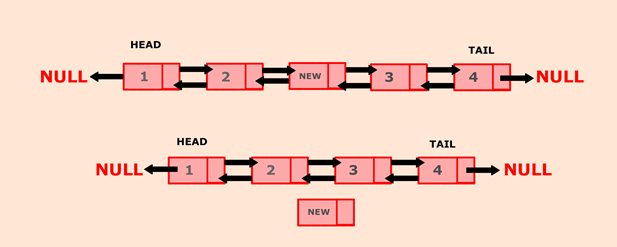In this program, we will create a doubly linked list and delete a node from the middle of the list. If the list is empty, display the message "List is empty". If the list is not empty, we will calculate the size of the list and then divide it by 2 to get the mid-point of the list. Current will point to head node. We will iterate through the list till midpoint is reached. Now current will point to the middle node. We delete middle node such that current's previous node will point to the current's next node.

Consider the above example, mid-point of the above list is 3. Iterate current from head to mid-point. Now, the current is pointing to the mid node which needs to be deleted. In this case, node new is the middle node which needs to be deleted. New can be deleted by making node 2 (current's previous node) to point to node 3 (current's next node). Set current to null.
ALGORITHM:
- Define a Node class which represents a node in the list. It will have three properties: data, previous which will point to the previous node and next which will point to the next node.
- Define another class for creating the doubly linked list, and it has two nodes: head and tail. Initially, head and tail will point to null.
- deleteFromMid() will delete a node from the middle of the list:
- It first checks whether the head is null (empty list) then, it will return from the function as there is no node present in the list.
- If the list is not empty, it will check whether the list has only one node.
- If the list has more than one node then, it will calculate the size of the list. Divide the size by 2 and store it in variable mid.
- Iterate through the list till current points to the mid node of the list.
- Connect current's previous node to current's next node.
- Delete the current node by setting it to null.
a. display() will show all the nodes present in the list.
- Define a new node 'current' that will point to the head.
- Print current.data till current points to null.
- Current will point to the next node in the list in each iteration.
PROGRAM:
Output: